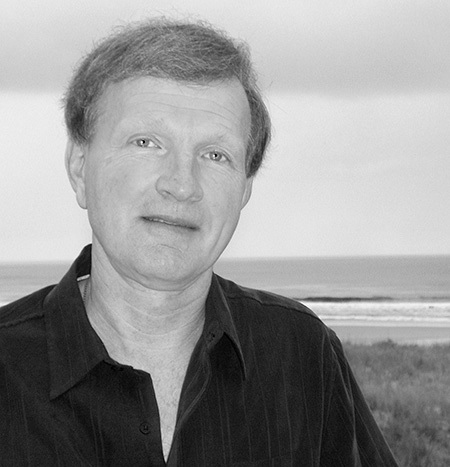George Harrar on Secrets and Lies

Secrets can haunt us. In George Harrar’s novel Reunion At Red Paint Bay (Other Press), secrets hunt us down for revenge. The literary thriller follows Simon, a small town newspaperman who has a happy marriage and comforting, if a bit boring, news beat. Yet, Simon has unwittingly been hiding an incident from his past. A night he remembers as innocent fun with a girl, and she remembers as rape. Decades later, her ghost comes back for vengeance in the specter of a very real-life stalker. Harrar plumbs morality and memory with expert psychological instincts, creating a creepy portrait of the face we show the outside world and how it often hides a more sinister persona underneath. Maine serves as a perfect backdrop as Harrar shows Simon’s family torn apart by fear and the past he has to face eventually, no matter the cost.
We spoke with Harrar about stalkers, revenge, what happens when our minds are out of balance, keeping hush-hush, and if the truth can actually set us free.
ROYAL YOUNG: How much do we value appearances? How do the people we pretend to be on the outside sometimes become more important than who we actually are?
GEORGE HARRAR: I think we all do craft a certain self-image. I guess the degree that our internal self-image matches the image we project, we perhaps feel really uncomfortable in the world when there is a difference. That can cause a lot of stress or bad feelings about ourselves. Simon is realizing the difference between what he’s projecting and what he really is.
YOUNG: What happens when we keep secrets?
HARRAR: I’ve read a number of instances of people who have really big secrets, and it’s always intrigued me. I think I gravitated to my plot. There was local fellow who returned to our town a few years ago and it came out that he had accidentally been involved in a death of a friend of his when they were adolescents. The fact that he came back to his hometown, where he knew the secret would come out, really amazed me, and I started to think about confronting your secrets and when you do it. But you can have a secret and not consider it such.
YOUNG: What’s so fascinating about the book is that the protagonist sees this secret from his past in an innocent way, yet it catches up with him.
HARRAR: And it’s been such a long time, that he almost considers that a former self. A different lifetime. But secrets don’t disappear. They’re not sectioned off. They’re just covered off by layers of life in between.
YOUNG: But you could argue that sometimes they lose importance after so long.
HARRAR: In terms of the book, for Simon, yes. But for the girl involved in his secret, no. She did not have the ability to leave behind that part of her life. Forgetting is a very good survival mechanism.
YOUNG: What about revenge? How much does that drive us?
HARRAR: The stalker in my book says he’s not even sure what would satisfy him, what he is trying to get out of it. He just knows he has to confront the person who has caused so much pain to his wife.
YOUNG: Though the stalker also makes a choice to live with this woman and never take any proactive steps to help her trauma. He also has a need to live in trauma.
HARRAR: I think it’s an important question, to what degree in life are we responsible for the whole life of another person? We may spark something or set something in motion in another person’s life by something we’ve done. Perhaps in a car accident we injure someone. Perhaps as a manager, we fire someone. There are a lot of things that could precipitate something negative in another person’s life. But does that make us responsible for everything that follows from it? Is there a statute of limitations?
YOUNG: I think there is. Just as Simon’s feels a need to portray himself as a hero, this woman feels the need to portray herself as a victim and the stalker feels the need to portray himself as a martyr. Everyone is choosing their own role.
HARRAR: And it’s a role that has no balance to it. It’s all one thing, and whenever we get tipped completely to one side, it’s bad.
YOUNG: So what happens when our minds are out of balance?
HARRAR: You’re so focused, I think your brain just doesn’t develop. It doesn’t cultivate other parts. I just don’t think it’s healthy to only have one pursuit, even if it’s a seemingly positive thing. You can do a positive thing to the nth degree, and it turns on you at some point. You become stuck.
YOUNG: I absolutely agree. Especially as Americans, we’re so focused and we believe in going after things by any means necessary, whether it’s career or relationship. There’s a big danger in that.
HARRAR: Yes, and in terms of morality, we can be very narrowly focused. So convinced of our point of view and righteousness, and it just doesn’t allow for circumstance or other people’s points of view. It’s very comforting because you don’t have to self-reflect, you just are. There’s a strain of that in American culture.
YOUNG: Yes and your book also deals with sex and our relationship to it, which is another big American thing.
HARRAR: Yes, sex and graduation night is a rather common thing in our culture, as a celebration of turning 18 and getting out of school, or just of liberation. Simon was all part of that mode and culture, but his date for the night obviously wasn’t.
YOUNG: Does the truth actually set us free?
HARRAR: [laughs] I guess I would say there’s a period where it may seem to.
REUNION AT RED PAINT BAY IS OUT TODAY, JANUARY 29.






